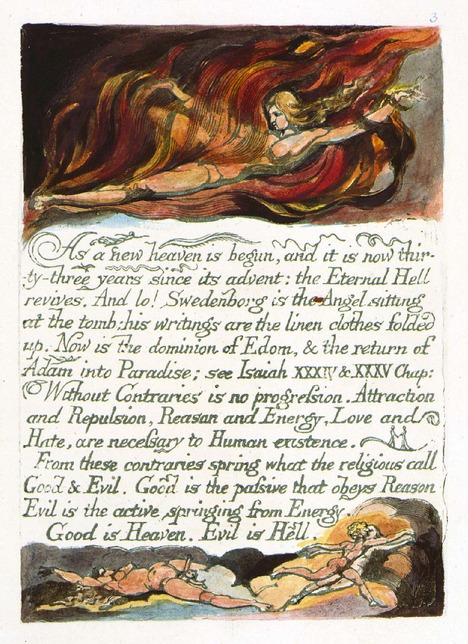 |
| Wikipedia Commons Marriage of Heaven & Hell Plate 3 |
June Singer, a Jungian psychologist, wrote several books on psychology but only one book on Blake. Her first book which developed from her thesis for her analysts diploma from the C. G. Jung Institute in Zurich, is titled The Unholy Bible: Blake, Jung and the Collective Unconscious. Although most of the book is a psychological analysis of The Marriage of Heaven and Hell, she provides insight into the later prophetic writings as well. In this passage she explains The Four Zoas in terms of individuation. The quote from Blake represents the reassembling of the pieces after 'all things are changd'.
"The long poem , The Four Zoas, describes the many aspects of man as they are differentiated from one another.The symbolism amazingly parallels the analytic process of differentiating the many unconscious contents from the other, and then gradually reintegrating them into a new and productive unity. The parallel is even more impressive when we consider that Blake uses the schema of nine nights of dreams, since dreams in analytical psychology provide the key to understanding the unconscious processes. It is with this key that Blake has unlocked 'the doors of perception' as he promised he would in The Marriage of Heaven and Hell. At the end of the ninth night man beholds the infinite vision, and he sings the Ode to Joy (we recall the first two lines, first uttered by the enslaved wives and children of America): [Four Zoas, Page 138, (E 406)]
'The Sun has left his blackness & has found a fresher morning
And the mild moon rejoices in the clear & cloudless night
And Man walks forth from midst of the fires the evil is all
consumd
His eyes behold the Angelic spheres arising night & day
The stars consumd like a lamp blown out & in their stead behold
The Expanding Eyes of Man behold the depths of wondrous worlds
One Earth one sea beneath nor Erring Globes wander but Stars
Of fire rise up nightly from the Ocean & one Sun
Each morning like a New born Man issues with songs & Joy
Calling the Plowman to his Labour & the Shepherd to his rest
He walks upon the Eternal Mountains raising his heavenly voice
Conversing with the Animal forms of wisdom night & day
That risen from the Sea of fire renewd walk oer the Earth
For Tharmas brought his flocks upon the hills & in the Vales
Around the Eternal Mans bright tent the little Children play
Among the wooly flocks The hammer of Urthona sounds
In the deep caves beneath his limbs renewd his Lions roar
Around the Furnaces & in Evening sport upon the plains
They raise their faces from the Earth conversing with the Man
How is it we have walkd thro fires & yet are not consumd
How is it that all things are changd even as in ancient times' "
More from Singer (Page 214):
"It is as if though the writing of this book were a very private experience, like a dream that belonged to Blake alone. It was the working through of the difficult union foretold in The Marriage of Heaven and Hell. An inner marriage was taking place in the psyche which was more real than his conventional with Catherine. As masculine creative force, his energy spurted forth abundantly. As feminine receptive vessel, his anima aspect functioned in his work to contain and shape that stream.
'The
cistern contains: the fountain overflows.' It was a secret happening, a
pregnancy, which could not be shown prematurely to the public. This is
why, I believe, Blake never engraved this book. Murry [John Middleton]
states it well when he says, 'It is the travail of Blake's final
rebirth.'"
.
.jpg)







